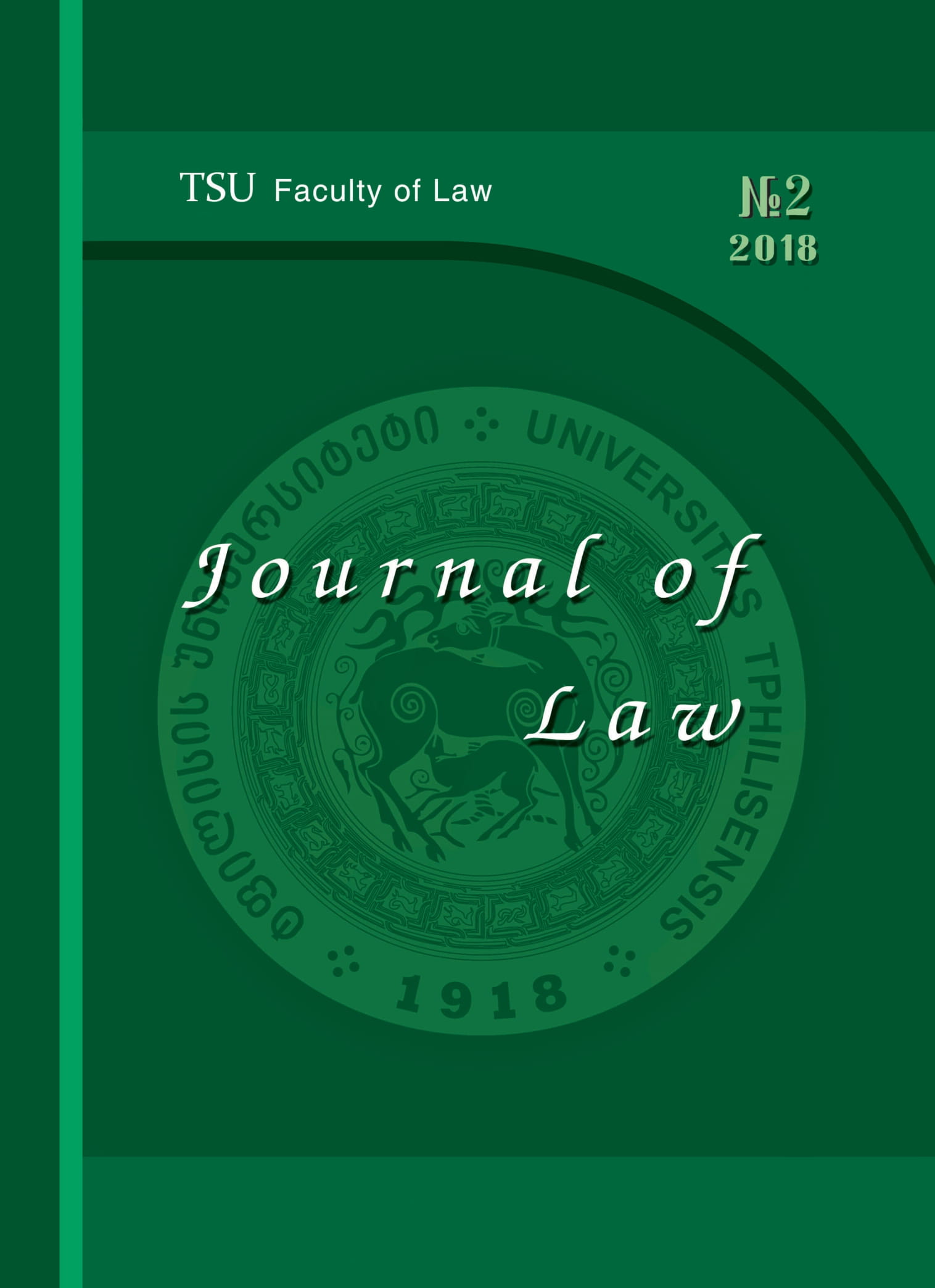Standards and Practices of Serving the Sentence by Persons with Disabilities
Keywords:
Persons with Disabilities, Penitentiary System, Reasonable Accommodation, Adapted Environment, Penitentiary Establishment, Barrier, Treatment, Status Determination, Punishment, Conditions.Abstract
This article discusses the specificities of serving a sentence by persons with disabilities (hereinafter – PWDs) and the new approaches aimed at addressing this issue, which would enable the Georgian penitentiary system and the legal framework regulating the system to introduce the latest, international standards oriented approaches and to provide PWDs with the conditions of serving a sentence in line with their needs and on equal basis with other prisoners.
The creation of reasonable accommodation and accessible environment for persons with disabilities is new to the society, in general, since it was mainly introduced in 2006 when the Convention on the Rights of Persons with Disabilities[1] was adopted. Georgia ratified the Convention in 2014, therefore the national legislation, the practice and legal framework regulating the penitentiary system require many novelties, changes and regulations in this regard.
This material is based on the analysis of the existing practice and legislation, which at present fails to create the environment of serving a sentence based on the protection of honour and dignity of persons with disabilities.[1] Convention on the Rights of Persons with Disabilities, UN General Assembly, 24/01/2007.
References
Constitution of Georgia, 24/08/1995.
Convention on the Rights of Persons with Disabilities, UN General Assembly, 24/01/2007.
Code of Imprisonment of Georgia, 24/03/2010.
Criminal Executive Code of the Kyrgyz Republic, № 17, 31/01/2017.
Criminal Executive Code of the Russian Federation, № 1-ФЗ, 08/01/1997.
Human Rights Action Plan of the Government of Georgia (for 2016-2017 years), Ordinance of the Govern-ment of Georgia № 338, 21/07/2016.
HM Prison Service, Prison Service Order – PSO 2855, Prisoners with Physical, Sensory and Mental Disabil-ities, 20/12/1999, https://bulger.co.uk/prison/PSO_2855_prisoners_with_disabilities.doc.
Istanbul Statement on the Use and Effects of Solitary Confinement, International Psychological Trauma Symposium, 09/12/2007, http://solitaryconfinement.org/uploads/Istanbul_expert_statement_on_sc.pdf.
UK Disability Discrimination Act 2005, c.13, 07/04/2005.
United Nations Standard Minimum Rules for the Treatment of Prisoners (the “Nelson Mandela Rules”), UN General Assembly, 08/01/2016, https://www.penalreform.org/wp-content/uploads/2016/11/¬PRI_Nelson_-Man¬dela_Rules_Short_Guide_Geo_final.pdf.
UN Human Rights Committee (HRC), CCPR General Comment No. 20: Article 7 (Prohibition of Torture, or Other Cruel, Inhuman or Degrading Treatment or Punishment), 10/03/1992.
Atabay T., Handbook on Prisoners with Special Needs, Criminal Justice Handbook Series, United Nations Office on Drugs and Crime (UNODC), New York, 2009, 6, 14, 43, 52.
Cavallaro J., Leading Human Rights Experts Call for Speedy Implementation of the Nelson Mandela Rules on Nelson Mandela International Day, Council of Europe, 2016, https://www.coe.int¬/en/web/com-missioner/-/leading-human-rights-experts-call-for-speedy-implementation-of-the-nelson-mandela-rules-on-nelson-mandela-international-day?desktop=false.
Council of Europe: European Court of Human Rights, Fact sheet – Persons with Disabilities and the Euro-pean Convention on Human Rights, 2019, 3, 4, 5, https://www.echr.coe.int/¬Documents/FS¬_Di¬sab¬led_-ENG.pdf.
Coyle A., A Human Rights Approach to Prison Management, Handbook for Prison Staff, International Center for Prison Studies, 2002, 49, http://www.prisonstudies.org/sites/default/files/¬resources/down¬loads/-handbook_3rd_ed_english_v5_web.pdf.
Department of Health and Prison Reform Trust, Information Book for Prisoners with a Disability, Offender Health and Prison Reform Trust 2009, 18, http://www.prisonreformtrust.o¬rg.uk/por¬tals/0/docu¬ments/¬di-sability%20pib.pdf.
Manduric A., UN Human Rights Experts (Again) Push for Access to U.S. Prisons, Call for Solitary Reform, Solitary Watch, 2015, http://solitarywatch.com/2015/07/24/un-human-rights-experts-again-push-for-ac-cess¬-to-u-s-prisons-call-for-solitary-confinement-reform/.
Public Defender of Georgia, National Preventive Mechanism: State of Rights of Persons with Disabilities in Prisons, in Institutions for Involuntary and Forced Psychiatric Treatment – Analysis of the Fulfilment of the Recommendations, 2014, 8, 17, http://www.ombudsman.ge/uploads/other/2/2253.pdf (in Georgian).
Vallas R., Disabled Behind Bars, The Mass Incarceration of People With Disabilities in America’s Jails and Prisons, 2016, 10, https://cdn.americanprogress.org/wp-content/uploads/2016/07/18000151/2Crimi¬nal-Justice¬Disability-report.pdf.
Citizen of Georgia, Shota Beridze and others v. the Parliament of Georgia, decision of 31 March 2008, № 2/1/392, the Constitutional Court of Georgia, 6.
Political Unions of Citizens – New Rightists and Conservative Party of Georgia v. the Parliament of Georgia, decision of 17 September 2010, № 1/1/493, the Constitutional Court of Georgia, 14.
Personal Interview with a person with disability, Trainer, Representative of an NGO working on disability issues, Tbilisi, September, 2017.
Downloads
Published
How to Cite
Issue
Section
License
Copyright (c) 2019 TSU Publishing House

This work is licensed under a Creative Commons Attribution-ShareAlike 4.0 International License.









